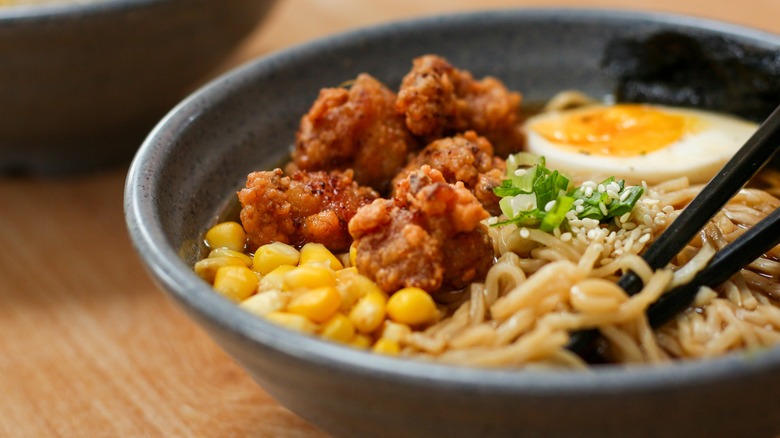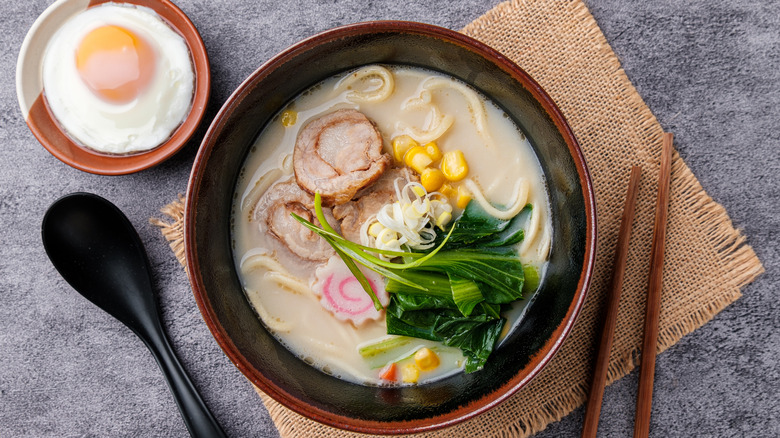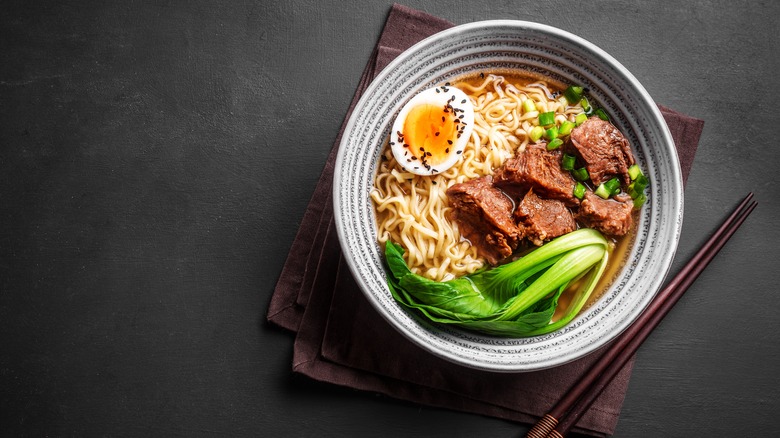The Absolute Best Type Of Wine To Pair With Japanese Ramen
Some nights are ramen nights — and sometimes, those same very nights also call for a glass of wine. It happens more often than you might think. But while the chef approved beer and ramen pairing is one that's fairly well known (you can more or less always grab a Sapporo and be set), the absolute best type of wine to pair with your Japanese ramen is not quite as widely discussed — nevertheless, it's equally as important. The type of wine you pair with your ramen is dependent upon the variety of ramen you're having, and while that might make it sound overly complicated, Tasting Table has an expert at hand to simplify things.
That expert is none other than Michael Schwicht, the assistant general manager of the ramen-famous restaurant, Momofuku, in Las Vegas. There are more than 27 different types of ramen, including both the Chinese and Japanese styles, but Michael Schwicht's advice breaks wine pairings into three categories: shoyu, tonkotsu, and miso.
Shoyu ramen calls for a combo of bready, mineral, and acidic flavors
Shoyu ramen is a clear ramen that's emboldened with the addition of a special style of Japanese soy sauce known as shoyu. Compared to other varieties of Japanese ramen, shoyu is unique because it dates back to a period as early as the 16th century, when soybeans began to be fermented with wheat, giving this ramen a bold umami and salty flavor that is still relatively light.
When asked what wine one should pair with a bowl of shoyu, Michael Schwicht told Tasting Table, "With the lighter body of a shoyu broth, my top choice is a Blanc de Blancs Champagne. Plenty of other options, but with its combination of high acid, minerality, and bready umami flavors, it's my go-to." A nice Prosecco could be another alternative option should Blanc de Blanc not be available, as both deliver the residual sugar and fermented flavors to complement the shoyu broth. Plus, if you prefer a little spice in your ramen, the bubbles will help cleanse your palate.
Pair tonkotsu ramen with a wine that stands up to its richness
Tonkotsu ramen is one of the most popular styles of ramen in the United States, and you can find it virtually anywhere. This ramen is traditionally made by simmering pork bones to create a dense and rich broth with a cloudy, fatty pork flavor. Schwicht admits that pairing Tonkotsu ramen, with its rich broth, can be a challenge, but a fun one.
Schwicht told Tasting Table, "I always try to find which wines guests gravitate towards before I try to tell them any wine is THE answer." In any case, he always suggests something with long weight, residual sugar, and a medium-to-high acidity to stand up to the rich tonkotsu broth. "A Spatlese riesling from the Mosel will usually do the trick, but Alsace pinot gris is another more esoteric option that I also love," Schwicht said. "The acid, body, fruit, and touch of sweetness, are a lovely contrast to the tonkotsu broth that gives your palate a fresh start after every sip."
Miso ramen calls for a robust wine
When it comes to miso-based ramen broths, no two bowls may taste the same. "Miso ramens can be wildly different depending on the type of miso, the proteins used, etc.," explained Schwicht. But according to him, one thing always holds true: "Miso ramens tend to be the most savory and umami-laden of the typical ramen styles. With this in mind, I try to accentuate this by leaning into pairings that have the same profile."
Schwicht himself loves pairing miso ramen with a rustic, Japanese sake, offering the Kimoto or Yamahai styles as recommendations for their complementary fermented flavors. But if you prefer wine to sake, Schwicht told Tasting Table that he also loves "white wines from the Jura, both chardonnay and especially savagnin, for their unique, slightly oxidative, and nutty aromatics, all echoed by many types of miso." Oak aged chardonnays will be what you'll want to look for when searching for a pairing for your miso ramen, as that will be the difference between a light chardonnay that will get washed away by the savoriness of the miso broth, and a robust one that complements it.



